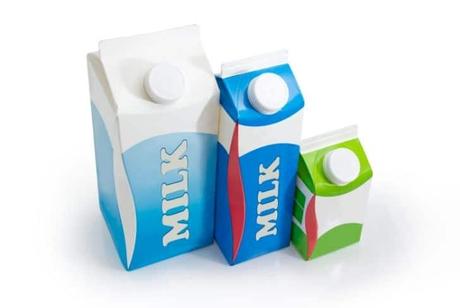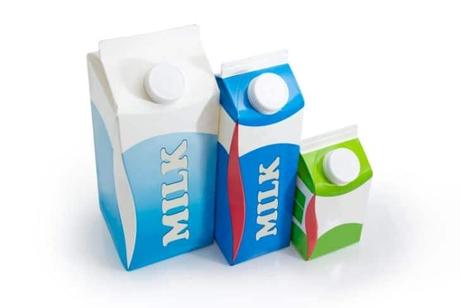Can You Recycle Milk Cartons?
One thing that you have almost always got in your freezer are milk cartons. However, while you will not finish them in a day, they do not last forever. Sooner than later, you will finish up the milk.
Now what comes next is what you can do with them. Do you just thrash them? Or can you safeguard the environment and recycle them.

These are valid questions, and that is why we have taken out time for this post. Here, we will answer the mind-boggling question, can you recycle milk cartons.
However, we will not stop there. We will go on to put your mind at ease by answering other related questions.
Dive in!
Are Milk Cartons Recyclable?
You are wondering why this is even an issue. After all, a milk carton comes from paper.
Well, that is where you are somewhat mistaken. While your milk cartons come from paper, that is not the only component.
Typically, your milk cartons come with a polyethylene layer. And, just in case you did not know, this is a plastic layer. Your manufacturers place them on each side of the carton. In other instances, some milk cartons come with aluminum foils.
Usually, your manufacturer combines these materials with paper taking as much as 85 percent in some cases. This layer is to ensure the carton is durable and can effectively preserve the milk.
However, this layer is not a problem. This is because you can also recycle polyethylene and aluminum. Usually, what the recycler will need to do is separate them and send them to the right plant.
So yes, you can recycle your milk cartons. However, you will have to keep in mind that some recycling facilities do not accept milk cartons for recycling. As such, it would be best to confirm that your local recycling facility does before dropping them off.
Are Milk Cartons Biodegradable?
When you say biodegradable, it means whether an item can break down naturally. And this, in turn, leads to the item becoming non-existent after a while. Well, when it comes to your milk cartons, we understand that you are also curious.
The fact is that they biodegrade. You should not be surprised as we have told you about their paper component. In turn, paper comes from trees, which are natural and allow microorganisms to act on them.
However, you must keep in mind that the biodegrading process is somewhat different from that of paper. This is because milk cartons typically comprise a thin layer of plastic.
As such, it can take as much as five years for it to complete decomposing. Sometimes, it might even need some additional months.
Can You Compost Milk Cartons?
One popular question that you might have on your mind is if you can compost your milk cartons. Well, it is understandable as you want to put your resources to good use.
Unfortunately, composting milk cartons is not as easy as composting paper. And this is because of the additional component that makes up a milk carton.
You will recall that we stated that milk cartons have a layer of plastic. And sometimes, aluminum foil. Well, you cannot compost these components. As such, their presence in your milk cartons makes it complicated to compost it.
So, unless you can tear down the plastic or aluminum foil component from the milk carton, and do that without leaving any residue, it is not the best bet to compost your milk cartons.
In case you did not know, those plastic components will not provide any nutrients to the soil. Even worse, they will get washed down into aquatic bodies. Then, you will be a contributor to a major cause of pollution around the world today.
Still, you can decide to give it a try. In such a case, you will need to tear the paper into smaller pieces. This way, it is easier for it to compost.
However, if you do not want to compost yourself, various companies will accept it. These companies have the right equipment to remove the plastic component. Then, you can get the paper component, which you can always compost.
Are Milk Cartons Better Than Plastic?
You must have seen your milk placed in plastic every time you were at the store. However, now you are wondering if you made the right choice going for carton containers.
Well, the fact is that both come with their advantages and disadvantages. However, it would be a better idea to stick with your milk cartons. This is because milk cartons come with more advantages than the plastic option.
For instance, you can easily recycle milk cartons compared to plastic thanks to their paper component. Even more, recycling centers spend less recycling milk cartons compared to plastic.
Also, milk cartons take less space and are lightweight. In turn, it means there is less carbon footprint during transportation. In case you did not know, this is a good thing for the environment.
Again, you would have to consider that milk in milk cartons is more likely to last longer than plastic unless it is opaque. This is because milk cartons are always opaque. In turn, this keeps the light out and makes it easier for you to get milk that retains its excellent quality.
Why Are Milk Cartons Bad for the Environment?
You know, a major aspect of buying things is ensuring they are environmentally safe. And while you could have denied it a few years back, this is not the case anymore.
Now, you must be extra careful about what you buy. Guess what? This extends to you when buying your milk and their milk cartons.
In case you did not know, milk cartons are bad for the environment. Now, you are most likely asking why. Well, this is because they cause a wide range of damage to your environment.
First, they are bad because of their large contribution to environmental pollution. As you already know, while you can recycle your milk cartons, it is somewhat difficult. Even more, not all recycling centers accept milk cartons for recycling.
In turn, this means a considerable amount of milk cartons end up in landfills where they cause pollution. Guess what, as early as 2015, mixed paper and plastic cartons contributed packaging waste to the landfills reaching as much 78 million tons.
Then, these landfills produce toxic fumes that cause environmental pollution. Even worse, some of these landfill deposits will find their way to aquatic bodies. And they cause a wide range of harm to aquatic life and even humans.
Without any doubt, this is bad for the environment.
What to Do with Used Milk Cartons? (Creative Uses)
Suppose you are not so interested in recycling your milk cartons. Or you cannot find a suitable place to recycle them. Do not worry; it is not the end of the world. There are various other options that you can put your milk carton to use with.
So, are you looking to jump in on this? Here are some popular options that you will find quite creative.
1. Kids Craft
One great thing you can get into is kids’ craft. You can always cut open your cartons and convert them to other nice structures. For instance, you can always build miniature houses for dolls, Lego figures, or birds. You can even go ahead to repaint them for the best effects.
2. Planter Box
If you are someone that loves gardening, then you are in luck. You can apply your milk cartons to great use as a planter box.
All you need to do is fill your milk carton with dirt. Afterward, create some small holes around the bottom. Then, you are good to go.
You can also use them to start seeds indoors. The great thing is that you can always label them. This way, you know what is inside each carton.
3. Floor Protectors
As you move your furniture around, you sometimes leave a dent on the floor. Even when you are just shifting it to pick something, it can be worse.
Well, you can use your milk cartons as floor protectors. This way, those movements do not always affect your floor.
All you have to do is to cut off the booties of your milk carton. Then, place it between your furniture’s leg and the floor. You can use it for your bed, tables, and even a sharp couch.
4. Bird House
Thanks to your milk cartons’ size, another great use you can apply them to is creating a birdhouse. And you can do this without much stress.
All you have to do is make a hole around the side of the carton. Then, add pine needles, straws, and any other natural liner. The goal is to ensure it comes off as a soft and comfy nest for the bird.
However, ensure that you place the carton somewhere high. This way, mice and rats would have no business with your birdhouse.
5. Collars to Prevent Bugs
You can also use your collars as protective collars for your plants. This is to help your plants survive the attacks of slugs and insects.
All you need to do is cut the carton. Then, make a collar with the carton around your seedling. This way, your plants mature without worrying about garden pests.
However, remember that as soon as your plants begin to mature. Then, it is time to take the collar off.
6. Organizers
You can always use your cartons as organizers. The great thing about them is that they can house loads and various materials thanks to their size and shape.
You can then place them on your workbench or desk. They are also a good fit inside your drawers.
However, just before using them for this purpose, ensure that you wash them thoroughly. You do not want to take this lightly. Otherwise, you will have the pens you put inside the carton smelling of sour milk. We bet you do not want that.
7. Paint Mixer
You can also use your milk cartons as a mixer if you are working on a painting project. It is even great for storage.
You can mix smaller quantities in them to confirm the results you would get. You can then transport them to the necessary locations.
However, remember to wash and clean them as soon as you are done.
Conclusion
Each year, you and other fellow Americans buy around six billion gallons of milk. Out of this, you drink as much as 20 gallons. Now, you can tell that you get a considerable amount of milk carton each year.
Well, this is why you cannot take any chances when disposing of your milk cartons. We have answered all you need to know about your options. So, make the environmentally safe choice.
References:
https://earth911.com/home-garden/recycling-mystery-milk-and-juice-cartons/
https://www.networx.com/article/10-uses-for-milk-cartons
https://ecoparts.com/10-types-of-trash-that-take-the-longest-to-decompose/


